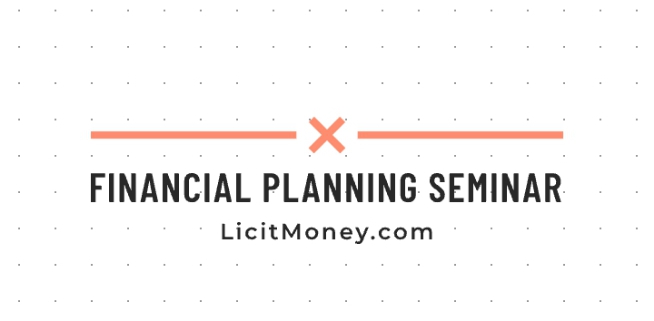Financial Planning Seminar In The United States
An informational guide on How to Arrange a Profitable Financial Planning Seminar in the United States.

This can be exciting and rewarding. It can help people learn about money management, saving, and investing. This guide will help you organize a successful seminar. LicitMoney will cover everything from planning or preparation to execution. Let’s get started!
1. Understand Your Goals
Before you start planning or preparations, think about your goals or objectives. What do you want to achieve from this workshop? Here are some common goals:
- Educate people about financial planning.
- Help attendees create a budget.
- Teach investment strategies.
- Promote your financial services.
Knowing your goals will guide your planning. It will help you decide on topics, speakers, and marketing strategies.
Read this also Top Financial Planning Tips For Teachers In The United States
2. Choose a Topic
Next, choose a topic. The topic should be relevant and interesting. Here are some ideas:
- Basics of budgeting
- Saving for retirement
- Understanding credit scores
- Investing in stocks and bonds
Make sure the topic matches your audience’s needs. You can also conduct a survey to find out what people want to learn.
3. Set a Budget
It needs a budget. A budget will assist you keep track of your expenses or expenditures. Here are some common costs to consider:
- Venue rental
- Marketing materials
- Speaker fees
- Refreshments
Make a list of all possible expenses. Then, set a budget limit. This will help you avoid overspending.
Read this also Dan Shaw Financial Planning In The United States
4. Find a Venue
Choosing the right venue is important. The venue should be accessible and comfortable. Here are some options:
- Community centers
- Libraries
- Hotels
- Conference rooms
Consider the size of the venue. It should be big enough to hold all your attendees. Also, check if the venue has the necessary equipment, like projectors and microphones.
5. Select Speakers
Good speakers can make your seminar successful. They should be knowledgeable and engaging. Here are some tips for selecting speakers:
- Look for local financial experts.
- Consider inviting a motivational speaker.
- Check their previous speaking experience.
Once you have a list of potential speakers, reach out to them. Discuss your seminar and see if they are interested.
Read it also Financial Life Planning In The United States
6. Create a Schedule
A clear schedule helps keep the workshop organized. It also helps attendees know what to expect. Here’s how to create a schedule:
- Start with registration.
- Include time for each speaker.
- Add breaks for refreshments.
- End with a Q&A session.
Make sure to stick to the schedule during the workshop. This will keep everything running smoothly.
7. Promotion
Now it’s time to promote your workshop. You want to attract as many attendees as possible. Here are some effective marketing strategies:
- Use social media platforms like Facebook and Instagram.
- Create flyers and distribute them in your community.
- Send out email invitations to your contacts.
- Partner with local businesses to spread the word.
Make sure to include important details, like the date, time, and location. Also, mention the benefits of attending.
Read this also
8. Register Attendees
Set up a registration process. This helps you keep track of how many people will attend. You can use online tools like Eventbrite or Google Forms. Here are some things to include in the registration form:
- Name
- Email address
- Phone number
- Any special needs (like dietary restrictions)
Make sure to send a confirmation email after they register. This will remind them about the seminar.
9. Prepare Materials
Prepare materials for your seminar. This can include handouts, brochures, and presentation slides. Here are some tips:
- Keep handouts simple and easy to read.
- Use visuals to explain complex topics.
- Provide resources for further learning.
Make sure to have enough copies for all attendees. This will help them follow along during the seminar.
10. Set Up the Venue
On the day of the workshop or course, arrive early to set up the venue or location. Here’s a checklist to help you:
- Arrange chairs and tables.
- Set up audio-visual equipment.
- Prepare refreshments.
- Display registration materials.
Make sure everything is ready before attendees arrive. This will create a welcoming atmosphere.
11. Engage Your Audience
During the workshop, engage your audience. Ask questions and encourage participation. Here are some ways to do this:
- Use interactive polls.
- Allow time for questions after each presentation.
- Encourage group discussions.
Engaging your audience will make the workshop more enjoyable and memorable.
12. Follow Up After the Seminar
After the workshop, follow up with attendees. This shows that you value their participation. Here are some follow-up ideas:
- Send a thank-you email.
- Share presentation slides and materials.
- Ask for feedback through a survey.
Feedback is important. It helps you improve future workshops.
13. Evaluate Your Success
Finally, evaluate or analyze the success of your workshop. Look at your goals or objectives and see if you achieved them easily. Here are some questions to consider:
- Did you meet your budget?
- How many people attended?
- What feedback did you receive?
Use this information to plan your next workshop. Continuous improvement is key to success.
Conclusion
This will takes time and effort. However, with careful planning and execution, you can create a valuable experience for your attendees. Remember to set clear goals, choose the right topic, and engage your audience. By following this guide, you will be well on your way to hosting a successful seminar. Good luck!